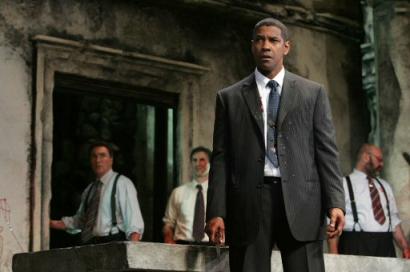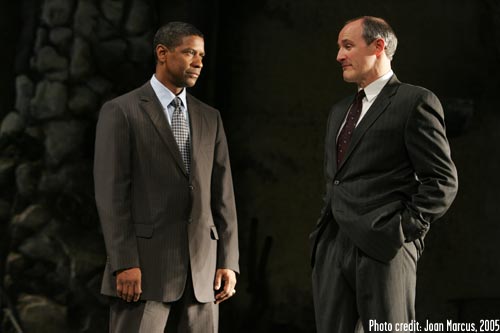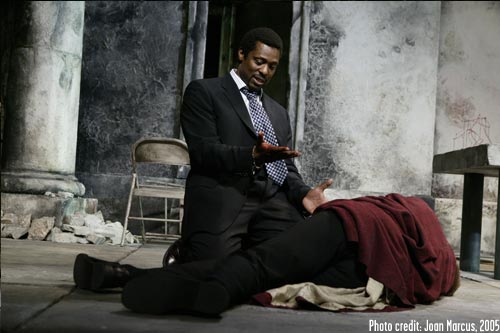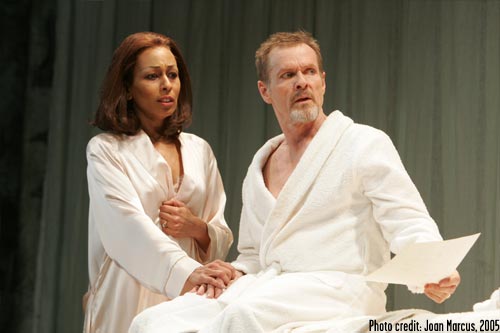“Twas down in Mississippi no so long ago,
When a young boy from Chicago town stepped through a Southern door.” FBI agents begin an exhumation of the murdered Emmett Till. “‘One purpose of this is to positively identify the remains and dispel any rumors as to whether it is truly Emmett Till or not,’ [FBI Spokesman] Bochte said. A second reason, he said, is to ‘see if any further evidence can be looked at to help Mississippi officials bring additional charges if warranted.’”
Category: History
Rehearsal for Reconstruction.
“The pattern of the South’s Reconstruction, more than the pattern of Japan’s, has anticipated occupations elsewhere — above all in Iraq, where some supporters of the old regime participate in a campaign of terror even as a long-oppressed and newly enfranchised group struggles to claim power. What are the lessons of our own self-reconstruction?” By way of The Late Adopter (who, darn it, beat me to the great “Fables of the Reconstruction” post-title), historian and Promise of the New South author Edward Ayers discusses the applicability of Reconstruction to current events.
Throat Cleared.
As suspected by several journalists and at the ripe young age of 91, Deep Throat reveals himself to Vanity Fair as W. Mark Felt, the FBI’s #2 man during Watergate. “‘I don’t think (being Deep Throat) was anything to be proud of,’ Felt indicated to his son, Mark Jr., at one point, according to the article. ‘You (should) not leak information to anyone.’” Update: With great hullabaloo, the Post confirms. Update 2: Nixon weighs in, as do Slate‘s Tim Noah (multiple times) and David Greenberg.
Foundation & Empire.
After 30 years of funding all manner of right-wing agitprop, the John M. Olin Foundation closes its doors, thus answering the question, “What if It’s a Wonderful Life had been about Old Man Potter instead of George Bailey?” “Without [Olin], the Federalist Society might not exist, nor its network of 35,000 conservative lawyers. Economic analysis might hold less sway in American courts. The premier idea factories of the right, from the Hoover Institution to the Heritage Foundation, would have lost millions of dollars in core support. And some classics of the conservative canon would have lost their financier, including Allan Bloom’s lament of academic decline and Charles Murray’s attacks on welfare.“
One More Crusade.
Moving a long-awaited project closer out of development hell, George Lucas approves the new Indy IV script. If Harrison Ford also approves, Indy IV could get a 2006 start, after Spielberg finishes both Vengeance, his Munich Olympics film with Eric Bana and Daniel Craig, and his Liam Neeson Lincoln biopic, based on a forthcoming book by Doris Kearns Goodwin.
From Dream to Decency.
By way of Ed Rants, American Rhetoric presents the “100 most significant American political speeches of the 20th century,” many of which are available as downloadable mp3s.
Washington in Rome.
“Why should his name be sounded more than yours? Write them, yours is as fair; Sound them, Yours doth become the tongue as well.” Why? Well, cause he’s a full-fledged movie star, that’s why. Still, despite having a bit of a muttering problem at times, Denzel acquits himself “honorably” as Brutus in Julius Caesar, which I saw last night at the Belasco Theatre. Set in a half-post-apocalyptic, half-Depression-era Rome that evokes anything from Masked & Anonymous to Black Hawk Down, this version of Shakespeare’s classic is innovatively staged and well-worth seeing, but, unfortunately, it also suffers from a stylistic dissonance that hinders the play at its most crucial moments.
The central problem with this production is the clash of acting methods. Many of the actors — and particularly Denzel — underplay their roles to the extreme. In fact, in delivery if not in diction, Denzel’s naturalistic Brutus is only a step or two from most of his other performances, be it Glory, Devil in a Blue Dress, or The Manchurian Candidate. That would be fine, if everyone else was on the same page, and a lot of the other actors are. Jack Willis (at left) deadpans Casca like Cypher from The Matrix, and Patrick Page steals his one major scene (in which he convinces Caesar to report to the Senate on the Ides of March) by portraying Decius Brutus as the worst kind of unctuous DC aide, complete with a leather executive folder in tow and a flatterer’s simper plastered on his face.
Unfortunately, some of the other actors didn’t get the memo. Bill Sadler’s Caesar is prone to acts of grandstanding, but that’s acceptable — he’s Caesar, after all, and bestrides the narrow world like a Colossus. No, the main offender is Colm Feore as Cassius, who plays the lean, hungry Machiavel in full “Master Thespian” mode — at times he’s hammier here than he was in Riddick. I’ll admit, I may be being a bit hard on Feore, as Cassius has always been one of my favorite Shakespearean characters (well, until he gets all weepy and high-maintenance in the second half of the play.) And Feore’s performance might be fine for a different cast of Caesar…but here, he’s just off. If this is Denzel’s Julius Caesar, as everything seems to suggest, Feore’s portrayal of Cassius should have mirrored Denzel’s low-key, understated Brutus. Instead, Feore is overplaying to the hilt, and the contrast is jarring in every scene the two central plotters share.
The Denzel-disconnect causes problems elsewhere, too, notably in the crucial Act III funeral speeches. Eamonn Walker makes a fine Mark Antony throughout, but he just doesn’t have the star wattage or natural charisma of Denzel Washington. As a result, Antony’s manipulative eulogy — the critical hinge moment of the play — seems slightly tepid and uninvolving compared to Brutus’ earlier rousing oratory. It’s possible that I’m just ruined by the James Mason-Marlon Brando version, as there does seem to be some precedent in the play for this take: “I am no orator, as Brutus is…I have neither wit, nor words, nor worth, action, nor utterance, nor the power of speech, to stir men’s blood.” Still, I think there’s a dramatic problem if Brutus’ oration is more of a showstopper than Antony’s. If anything, it seems here that their roles should have been reversed.
Still, despite these grievances, Julius Caesar is a satisfying production for the most part, with some particularly nice visual flourishes throughout. The Escape from New York, Berlin-bunker look of the set seems strange at first, but gains potency as the play darkens — in the “Cinna the poet” mob scene, for example. (Speaking of which, between this and Sith, it’s been a bad week for republics.) And I particularly liked the look of the Senate, even if it was somewhat reminiscent of Liev Schrieber’s EXCOMM war room in the Henry V revival two years ago. (With that in mind, the play gets off a great Homeland Security gag, as the various conspirators have to figure out a way around the Senate metal detector.)
The war scenes of the final acts are also surprisingly kinetic, with Roman forces garbed in guerilla green or black weaving through the hollowed-out set and spouting commands in verse. In fact, while I guess this shouldn’t be a shock given the subject matter, this production of Julius Caesar is also quite grisly — they don’t skimp on the blood and gore, and Sadler’s corpse is frozen in a horrifying Ring-like rictus scream during the Antony speech. (Strangely, this produced nary a shudder in the crowd, while the mere sight of Caesar’s bare posterior earlier on sent the audience into a paroxysm of shocked gasps — the MPAA has screwed up this country something fierce.)
So, in sum, Julius Caesar is a worthy production that makes for a good evening out, but it’s got some issues that keep it from being an all-time classic version of the play. The fault, dear readers, is not in its stars, but in its supporting cast, that they are underlings. In the end, a more balanced production, with either more or less star power, would have probably worked out better.
Archives Away.
“‘We run into this all the time in the archive business,’ said Vicky Risner, who is in charge of acquisitions for the music division of the Library of Congress. ‘People deny they’re going to die.'”” The NYT delves into the collapse of a will-less archive, in this case the prodigious collection on black dance amassed by the late Joe Nash.
Decline and Fall.
Also in Slate‘s History Week coverage, Mark Lewis surveys the recent literature on Teddy Roosevelt, with particular attention to TR’s post-1912 downward trajectory.
Unpopular chic.
“If a book is conceived with only historiography in mind — with academic disciplinary debates and research agendas dictating the focus and the form — it’s unlikely to succeed in the public realm. If it’s conceived without historiography in mind, it’s unlikely to succeed as scholarship. So, how do we develop what we might call a Goldilocks approach to historiography?” In a very intriguing two-part article for Slate, David Greenberg of Rutgers University makes the case for historians breaking out of the Ivory Tower.
My friends and colleagues here have heard me rant about this on many opportunities — For all the talk of transnationalism and blurring borders in the field right now, the border between academia and popular history remains rigorously guarded by historians who too often equate accessibility with poor scholarship and second-rate thinking. On many occasions, we’ve been told by visiting scholars — including some very big names — that, for better or worse, we’re fated to do “history-professor history” that will have “no effect” on how Americans see their past.
In short, I find this line of thinking very disquieting. Frankly, writing American history tomes that only a rarefied community of scholars will “get” seems to me a rather sad way to spend a life in the discipline. Whatsmore, it’s no accident that right-wing interpretations of the past, be they neo-con or free-market fundamentalism, for example, tend to gain a wider currency in today’s political climate than left-wing ones do. It’s partly because academics on the right seem to have less qualm about popularizing their ideas for a mass audience (and they’ve got more institutions to disseminate them, but that’s another story.)
I find something profoundly irritating about scholars who claim that “ordinary people” will never understand their ideas, and then go on to complain about the nation’s right-wing drift. While it may be hubris to think that any one scholar’s work will make all that much of a difference, it’s still a worthier goal, to my mind, than composing a work of great theoretical insight that’s completely inscrutable to all but those academic elites similarly ordained in the historical arts.






